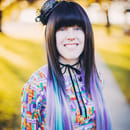I wear glitter on a daily basis. I love shopping so much that I’m tempted to list it as a hobby. I’ve worn hair extensions and I basically live in full, colorful, girly skirts. And I’m also a feminist.
What do these things have to do with one another? On the surface, nothing. But my journey to feminism was a long one, and that’s because I lacked understanding about what being a feminist meant.
I’m not surprised that so many women have taken to publicly rejecting feminism lately. With all the myths and stereotypes associated with feminism, it makes sense to question that belief system instead of subscribing to it. And just like any other widespread movement or belief system, there are some feminists who don’t uphold the values in a positive light, and give the movement a bad reputation.
Many people believe that feminism means a rejection of anything associated with being stereotypically feminine, along with a rejection of men, too.
The fight for feminism is not about hating men, or rejecting anything feminine. You can be a feminist and wear makeup. You can be a feminist and be a stay-at-home mom. You can be a feminist and love the color pink, carrying a purse, and taking selfies.
Feminism is about the fight for equality and the right to choose. Feminism means that you have the option to be a stay-at-home mom rather than being forced into it. Feminism fights for equal pay and equal values.
These are all things I learned when I began learning about feminism in late high school and my early college years. I’d always admired early feminists for what they did: getting women the right to vote, for one thing, and even burning their bras, which I could not imagine. I thought of feminists as strong, independent women.
I had so much to learn, especially about privilege and intersectionality. I had never really thought about what intersectionality meant or how it related to feminism. Intersectionality is the way that oppressive institutions are interconnected and can’t be separated. For example, intersectional feminism doesn’t ignore the fact that some women are oppressed not only because they’re women, but because they are women of color, queer women, low-income women, or even a combination of all three. Intersectional feminism fights against all those injustices at once, rather than focusing on women’s rights while ignoring other forms of oppression that harm women.
By taking on the label feminist, I chose not to ignore privilege and intersectionality. I took a stance to check my own privilege in every situation, and not speak for groups that I’m not a part of. These were all things I thought about during my journey as a feminist. I’m white, so I have white privilege. I can’t, and should never, speak for women of color. I can support them in their fight and act as an ally, but I can’t have my voice heard above theirs. Their voices are the most important ones when we’re dealing with issues of racism and xenophobia.
I’m queer and disabled, so I speak on behalf of my own communities. Despite being disabled, though, I am not every disabled person. I’m able-bodied and not mentally ill, so I don’t speak on behalf of those communities. I’m queer, but I’m not transgender or intersex, so I let those communities speak for themselves.
Recognizing my own privilege is a difficult task. There’s nothing like acknowledging the fact that, because of some part of your existence and identity you can’t change, you have it easier than someone else. If you’re like me, and you believe in equality, it hurts to think about the challenges others face because of oppression.
But it’s a necessary part of the fight. I live by the saying, “Nothing about us without us,” which was coined by the disabled community to say that conversations about disabled people need to include disabled people. I extend that saying to every single oppressed group. Sometimes, my gut reaction is to speak up about something. I was angry about the way Kylie Jenner was posed in a wheelchair for a fashion shoot. But I’m not a wheelchair user, so it was really important to me to act as an ally, and not a spokesperson. I talked to several wheelchair users about the issue and used them as a sounding board for my ideas. I was angry about the backlash Beyonce got for her single, “Formation.” I’m not a person of color, though. My words have to exist to support the communities facing the oppression, not to drown them out. Allies are so important, but they can never be as important as the voices of the very people being oppressed.
What does it mean to be a feminist? That’s what I ask myself every day. I’m not a perfect feminist. I was socialized in a society that teaches women to fight one another, to call each other slurs, to slut shame, to fight over men, to blame the “other woman” when a man cheats on her. That’s why these callouts exist, and I’m not exception.
It makes me sad when women declare that they aren’t feminists, but I’m not shocked that it happens. As feminists, we should spread the word about what it means and why it’s important, and debunk the myths that exist. We’re not here to take over privilege that men have. All we want is to dismantle the existing forms of privilege that oppress others, women included. And that’s a message I will always stand behind.


